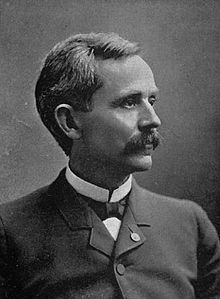Joseph W. Fifer
Joseph Wilson Fifer (born October 28, 1840 in Staunton , Virginia , † August 6, 1938 in Bloomington , Illinois ) was an American politician and from 1889 to 1893 the 19th governor of the state of Illinois.
Early years and political advancement
Joseph Fifer's parents were German. His father worked as a bricklayer. The family later moved to Missouri. His mother died there. The family then returned to Virginia. When Fifer was 17, the family moved to Dry Grove Township in McLean County , Illinois. Fifer worked in a brick factory there.
He took part in the Civil War on the side of the United States as a common soldier and served with his brother in the 33rd Illinois Volunteer Infantry Regiment . As part of General Grant's campaign against Vicksburg , he was wounded near Jackson, Mississippi , and spent the remainder of the war as a guard on a patrol boat. During the war he adopted the nickname "Private Joe".
After his military service he studied at Illinois Wesleyan University until 1868 and then law at Prince & Bloomfield law firm in Bloomington .
After successfully admitting to the bar, he began practicing in Bloomington in 1869. The Republican Fifer began his political career in 1871 as an advisor to the Bloomington Borough Council. Between 1872 and 1880 he was a district attorney in McLean County. He served in the Illinois Senate from 1880 to 1884 . His party nominated him as a candidate for the gubernatorial election of 1888. In the elections he prevailed against the former incumbent John M. Palmer .
Illinois Governor
Fifer's four-year tenure began on January 14, 1889, during which time the State Historical Library of Illinois was established. A reform of the electoral law was initiated and the school laws improved. In the school sector, women were given the right to vote for the first time. In 1890 the University of Chicago was founded. In banking, bank directors were required to own at least ten shares in their own bank. By 1890, the population of Illinois had risen to over 3.8 million; that meant an increase of about 800,000 since 1880. In 1891 he pardoned the English serial killer Thomas Neill Cream , who returned to England and continued to murder there.
Fifer ran for re-election in 1892, but was defeated by his Democratic challenger John Peter Altgeld . In the further course he was twice offered the re-nomination for governorship, which he refused.
Further life
On November 10, 1899, he was nominated by US President William McKinley for the seat of William J. Calhoun in the Interstate Commerce Commission for a remaining regular term until December 31, 1903. On December 6, 1899, it was confirmed by the US Senate . On December 16, 1903 he was replaced by President Theodore Roosevelt for a new term until December 31, 1909/9. Nominated March 1910 and confirmed by the Senate the following day. On December 30, 1905, however, he resigned prematurely. He was succeeded by Franklin Knight Lane .
He then worked again as a lawyer in Bloomington. At the same time he was considered a contemporary witness and source for the life and work of Abraham Lincoln and Ulysses S. Grant and was therefore often asked about it.
In 1920 he was a delegate to a meeting to revise the Illinois Constitution. In 1921 he was one of Len Small's attorneys on embezzlement proceedings.
At the age of 92, Fifer was seriously injured in a car accident. For the last six years of his life he was blind and deaf due to old age and disabled since the accident. After breaking his hip in a fall on March 13, 1938, he was bedridden until his death on August 6, 1938.
Joseph Fifer was married to Gertrude Lewis. The couple had two children, including daughter Florence Fifer Bohrer , who was elected the first woman to the Illinois Senate in 1924.
Web links
- Joseph Fifer at the National Governors Association (English)
- Illinois Blue Book History and Election Results, p. 368
- Joseph W. Fifer in the database of Find a Grave (English)
- Clarence Altha Miller: The lives of the Interstate Commerce Commissioners and the Commission's secretaries. Washington, 1946 ( hathitrust.org [accessed June 24, 2019]).
- Interview December 1935 / January 1936 Chicago Sunday Times: Part 1 , Part 2
| personal data | |
|---|---|
| SURNAME | Fifer, Joseph W. |
| ALTERNATIVE NAMES | Fifer, Joseph Wilson (full name) |
| BRIEF DESCRIPTION | American politician |
| DATE OF BIRTH | October 28, 1840 |
| PLACE OF BIRTH | Staunton , Virginia |
| DATE OF DEATH | August 6, 1938 |
| Place of death | Bloomington , Illinois |

